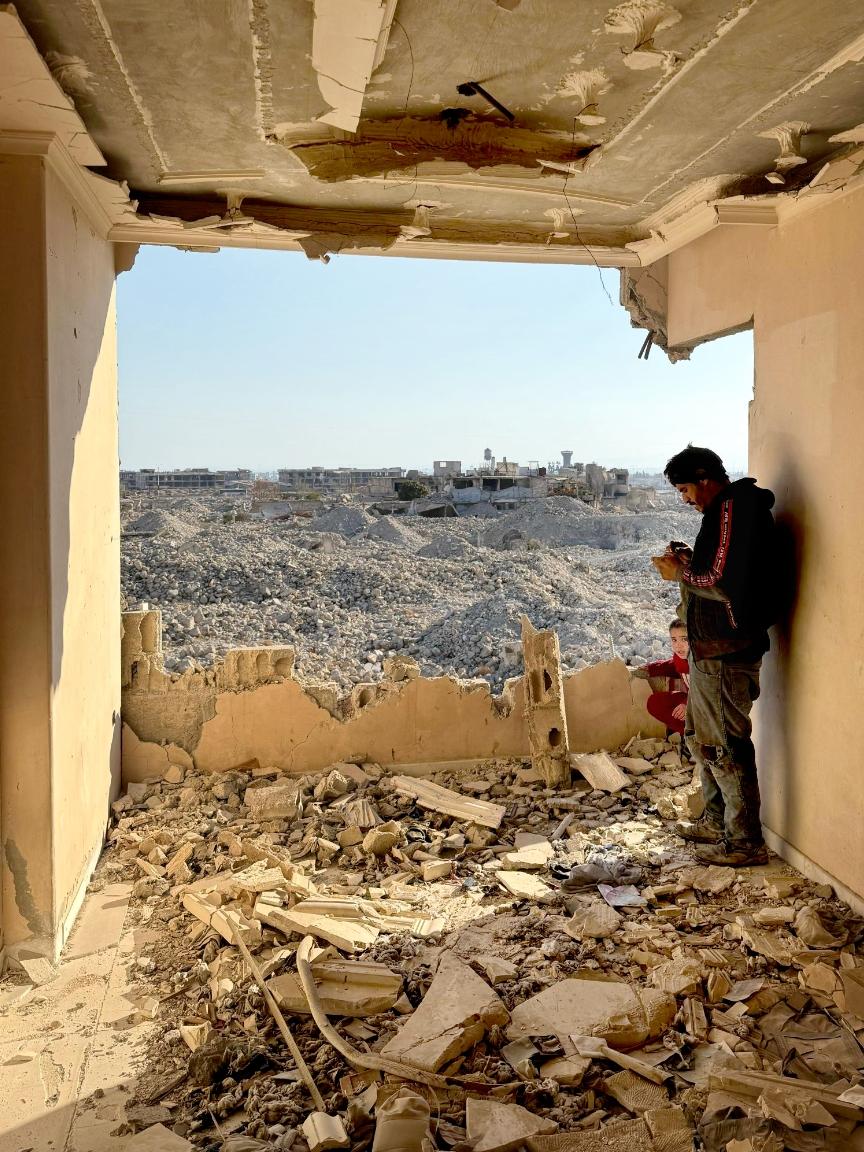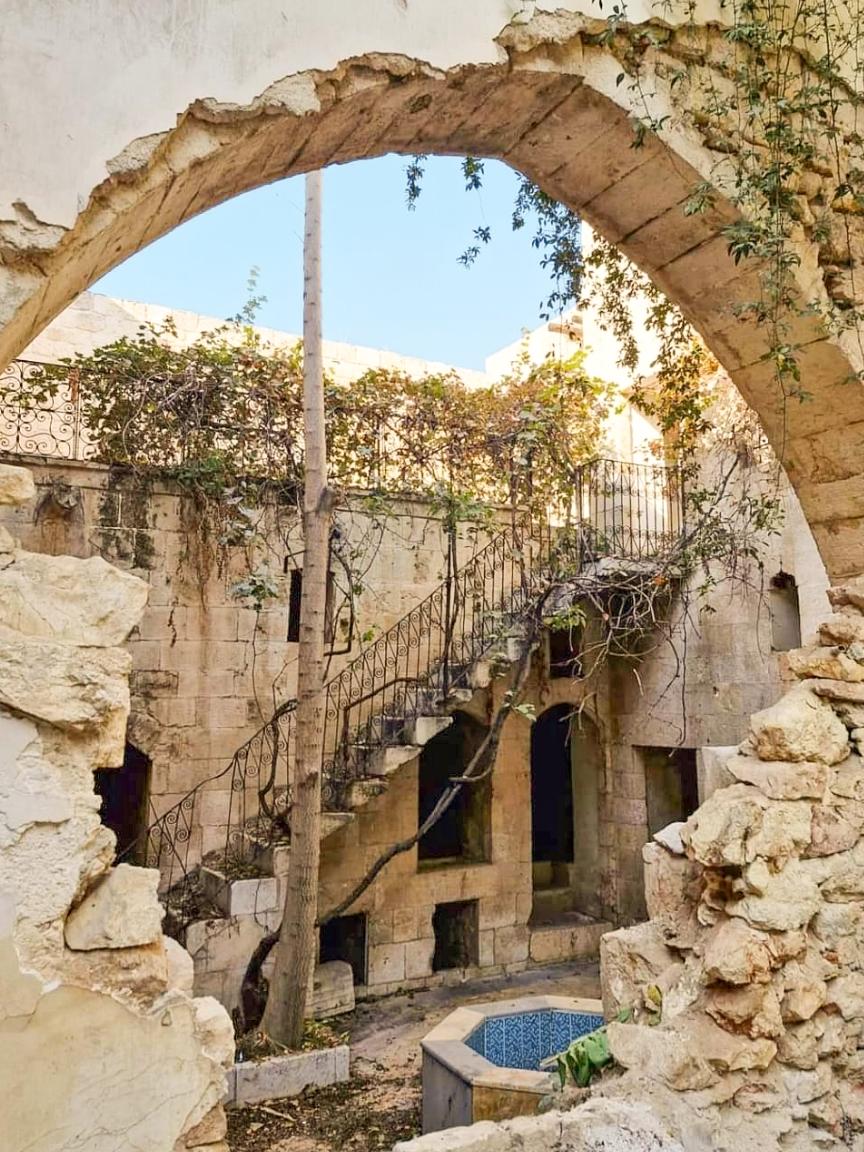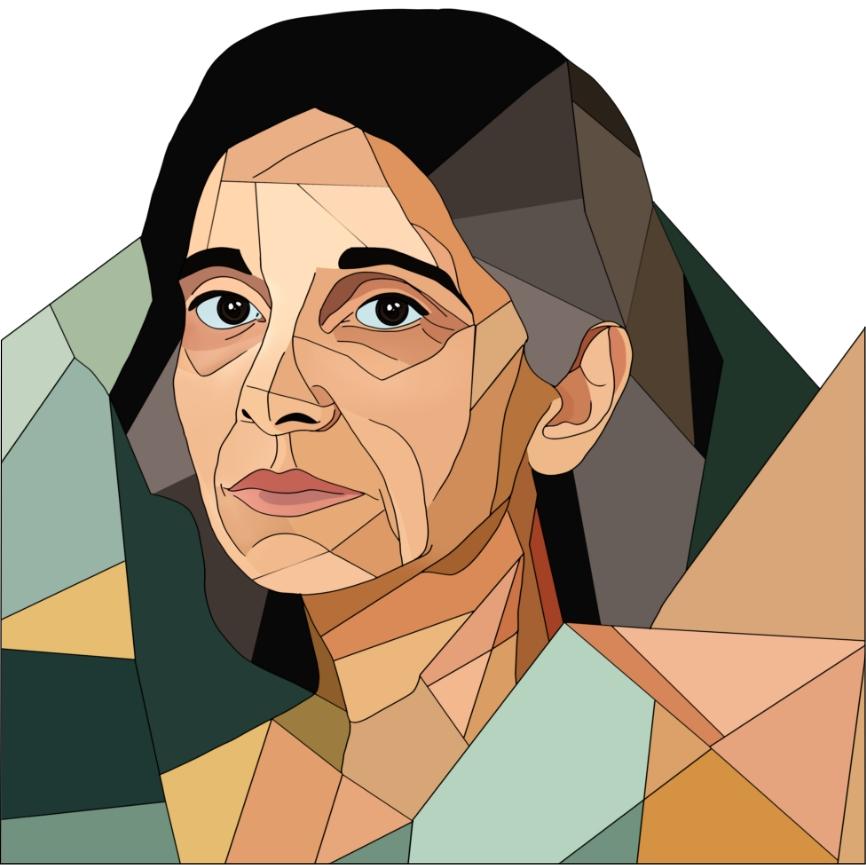Six years before the fall of the Assad regime, GIZ began working with international and civil society organisations on behalf of BMZ to pave the way for the reconstruction of Syria. Documents and information pertaining to housing, land and property (HLP) rights were compiled, secured and systematically archived. Trusted media were used and events organised in refugee camps to inform refugees and internally displaced persons about this initiative. GIZ and its partners also established a network of Syrian HLP experts from a whole range of fields. Their expertise is vital for ensuring that the country is rebuilt politically, socially and economically.
 Illustrationen: Midjourney; Prompt: 3st kommunikation
Illustrationen: Midjourney; Prompt: 3st kommunikation
A matter of justice and dignity
In order for Syrians to rebuild their country in a just and stable manner, the property rights of refugees and displaced persons must be secured. Together with partners, GIZ has created an important basis for this to happen.
What can you do if you were forced to flee from your home, and other people are now living in it? What can you do if you lost the title deed for your house while fleeing or it was burned in an attack? What can you do if the old regime confiscated your family’s plot of land and transferred it to one of its supporters?
With the Assad regime toppled, Syria has turned the page on its past. Nonetheless, the country is still fragile after 14 years of war, and large swathes of its territory lie in ruins. And yet hopes are high that the economy will recover, and poverty and destitution will decrease now that sanctions have been lifted. However, before the country and its people can find peace, there are many questions to be answered, not least in relation to property rights for refugees and internally displaced persons (IDPs). These rights are a key requirement for stability in Syria and for the potential return of its population, as underscored in a new report by the Norwegian Refugee Council. Some 5.6 million people fled Syria during the war and more than seven million people were internally displaced within the country.
Rana Mitri is a Lebanon-based Syrian lawyer working for GIZ. With reconstruction and investment activity expected following the lifting of sanctions, she sees an urgent need to establish who owns what. Mitri and her colleagues are working to secure documents on housing, land and property (HLP) rights in Syria and make them available digitally in the future.
 HLP GIZ
HLP GIZ
View from a residential building in Syria's capital Damascus, which was destroyed during the civil war.
The German Government suspended intergovernmental cooperation with Syria following the Assad regime’s brutal crackdown on peaceful demonstrations in 2011. During the years of civil war that ensued, the German Federal Ministry for Economic Cooperation and Development (BMZ) provided support exclusively to the Syrian population directly and in neighbouring host countries. GIZ also worked with the United Nations and non-governmental organisations in a number of areas. This included cooperation in healthcare and in the provision of basic services for refugees in neighbouring countries.
A far-sighted commitment to property rights
GIZ has been working on behalf of BMZ since 2018 to lay the groundwork for Syrian refugees and internally displaced persons to secure and enforce their property rights after the fall of the regime. This initiative came about partly in response to a controversial property law introduced by the Assad Government. The law contravened internationally recognised rights to property and housing as enshrined in international human rights treaties. Displaced Syrians were severely affected by the legislation, which required property owners to submit proof of their property rights in person within a short period of time. For regime critics who had fled their homes, this amounted to expropriation, as it would have been too dangerous for them to return.
It was not until 8 December 2024 that Syrian ruler Bashar al-Assad and his regime were toppled. Rana Mitri recounts the tearful disbelief with which she followed the events of this historic day on the news. ‘I never thought I’d see this in my lifetime,’ she says.
Documents secured by courageous individuals
For a long time, the fall of the Assad regime seemed highly unlikely. But this did not deter GIZ staff from working tirelessly over many years to ensure that important documents in Syria were not lost. GIZ teamed up with civil society partner organisations and courageous individuals in the country to protect property rights.
‘Some public servants had previously worked in land administration and land registries. They had been scanning documents since 2013, aware of just how important these papers might be one day,’ says Mitri. Having learned of the valuable documents, GIZ was able to contact people in areas not controlled by the regime. ‘We gained their trust, and they gave us hard drives containing vast numbers of records. This was possible in part thanks to Germany’s good reputation among large parts of the population.’
Germany worked with the International Organization for Migration (IOM) and other partners to safeguard these key documents for the future and make them available in digital form. ‘The IOM took possession of the documents and we supported them in developing an IT system that a trustworthy Syrian government could use in the future to ensure that property rights are returned to their owners,’ explains Mitri. So far, 1.7 million HLP documents have been archived and 33,000 HLP applications from refugees have been collected.
It is the people behind the statistics that motivate Rana Mitri to do what she does. One encounter in a refugee camp in Lebanon left the lawyer particularly moved. There was an elderly Syrian woman there who did not want to know anything about property rights. ‘Why are you talking to me about my land? I have had to bury three sons here in the war. I do not want it anymore,’ said the woman defensively. A little while later, however, the grandmother had resolved to do everything in her power to get her land back: ‘They have taken my life, my dreams and my sons from me. But now I am going to protect my house and my land for my grandchildren.’ For this woman, after all she has been through, it is ultimately a matter of dignity and justice.
 HLP GIZ
HLP GIZ
Remains of a traditional house in the old town of Aleppo. The Syrian city suffered heavy attacks during the civil war and was also affected by the earthquake in early 2023.
Here are five anonymised case studies of refugees who took legal advice supported by GIZ.
Najwa
Najwa, from Syria, fled to Jordan in 2014 to escape heavy fighting in her home town of Daraa, just a few kilometres from the border. Shortly before fleeing she had made the final payment on her house. However, she was unable to register her ownership of the building, because under the Assad regime this entailed political checks. She is now trying to secure legal documentation to prove her property claim, so she can live in her house again with security.

Zakwan
Originally from Homs in western Syria, Zakwan fled to Jordan with his family in December 2012. In his hurry to leave he did not take the official deeds to the family home. Later, he heard that the house had been destroyed. In July 2023, Zakwan took part in an information event on housing, land and property (HLP) rights, organised by GIZ partners. The individual legal advice he subsequently received is supporting him in asserting his property rights in today’s Syria and in obtaining a new deed for his plot of land.
Fadi
Fadi, from Syria, was arrested in 2015 and charged by the Syrian Counter-Terrorism Court, an extraordinary judicial body of the Assad regime. At the time, he owned a piece of land in Darayya, a suburb of the Syrian capital Damascus. The property was temporarily confiscated while he was in custody. Although Fadi was acquitted of all terrorism charges and then released, the record of the confiscation of his property remained in place. He has now sought legal help to get this cancelled and re-establish his full ownership rights after many years.

Bassam
During Bashar al-Assad’s rule, property belonging to Bassam’s family was confiscated by an official, without any legal justification. Before the fall of the regime, this member of Syria’s so-called security forces merged it (illegally) with an adjacent piece of land, thereby altering the official property boundaries. This has made it difficult for Bassam to assert his rights, as different plans are recorded in the land registry documents.
Nada
Nada’s brother died while fleeing from the Assad regime. He was unmarried and had no children, so his siblings were the only heirs to his house. However, all the documents were destroyed in a fire during the war. Now Nada is fighting on behalf of the family to prove their ownership and inheritance rights.

Disclaimer: The case studies were recorded anonymously during consultations by advisors in the HLP team. Illustrations, created using artificial intelligence, are symbolic and do not represent the persons named.
Digital solutions for refugees and IDPs
How can information technology help Syrian refugees and internally displaced persons (IDPs) to assert their rights? A database that links digitised documents with georeferencing data and systematises this information while offering legal advice is a key instrument for protecting housing, land and property (HLP) rights. GIZ worked closely with the IOM in Geneva to establish this database, which also provides information on ownership before state, humanitarian or economic measures are introduced (due diligence check). Those concerned will be able to access specific documents in the database in the future and will also receive legal advice. This means that individuals can be confident that the actors involved in the reconstruction process take their HLP rights seriously. Refugees and IDPs in crisis and conflict regions often find it difficult to document their property rights. GIZ’s work in Syria shows how people can be supported in protecting these rights.